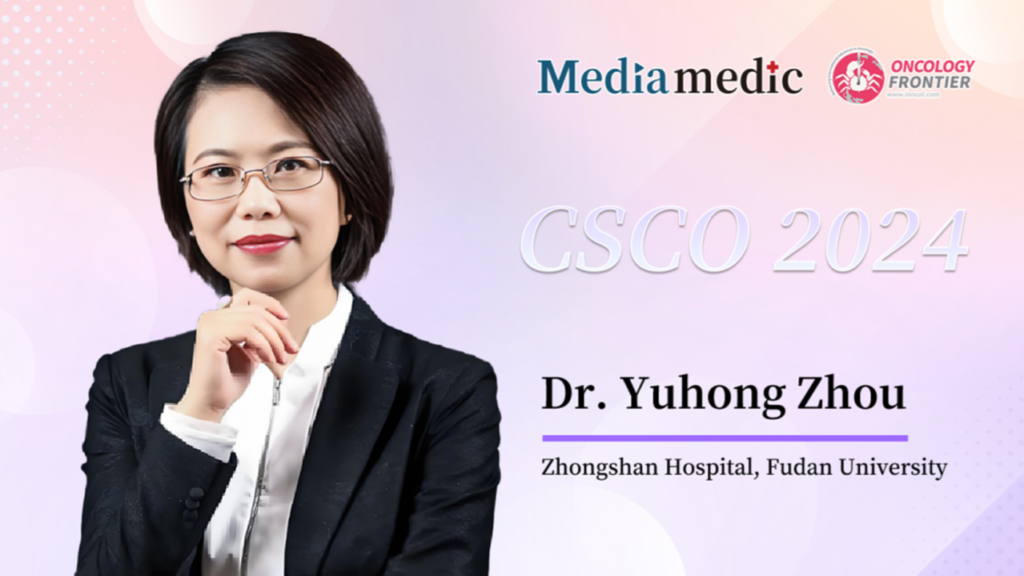
Editor’s Note: Soft tissue sarcoma (STS) is a highly heterogeneous group of tumors with complex pathology, and the benefits of first-line chemotherapy, primarily anthracycline-based, are limited. As a result, patient prognosis remains poor overall. In recent years, anti-angiogenic tyrosine kinase inhibitors (TKIs) have emerged as a promising option for second- and later-line treatments, with potential for expansion into the first-line setting. At the 2024 CSCO conference, Dr. Yuhong Zhou from Zhongshan Hospital, Fudan University, delivered a detailed presentation on the latest research in anti-angiogenic TKIs for STS. In an exclusive interview with Oncology Frontier, she also shared insights into the advancements in diagnosis and treatment in this field.1. Oncology Frontier: Soft tissue sarcoma is known for its complexity and poor prognosis. Can you give us an overview of the current status of diagnosis and treatment for STS?
Dr. Yuhong Zhou: Thank you for the continued focus on STS. Soft tissue sarcoma is a large, complex group of mesenchymal-origin malignant tumors, making up only 1% of all solid tumors but consisting of over 50 different subtypes. Each subtype has unique biological characteristics and prognostic outcomes. Our treatment approach has evolved from treating STS as a single entity to more personalized strategies based on the subtype. We’ve moved from traditional surgery, radiotherapy, and chemotherapy to a comprehensive treatment era that includes immunotherapy and targeted therapies, enabling us to make significant strides in precision medicine for STS.
Subtyping is crucial in STS. Different subtypes exhibit varying sensitivities to chemotherapy. Therefore, the first principle in treatment is to identify the pathology and classify patients based on chemotherapy responsiveness and disease stage. For example, in high-risk, chemotherapy-sensitive patients, adjuvant chemotherapy or radiotherapy may be considered post-surgery. In cases with high tumor burden, difficult surgical resection, or high histological grade, we advocate for neoadjuvant radiotherapy or chemotherapy before surgery. Advanced-stage patients require even more attention due to the high risk of recurrence and progression. Historically, the standard treatment for advanced STS has been anthracycline-based chemotherapy. However, this approach has significant limitations, including low response rates with monotherapy and high toxicity with combination therapies, offering limited overall survival (OS) benefits. Recently, there has been increasing exploration of how to combine standard chemotherapy with targeted and immunotherapies to further improve outcomes.
In the field of targeted therapies, anti-angiogenic TKIs are particularly important for sarcomas. Drugs like anlotinib have greatly expanded our treatment options. Combination regimens involving chemotherapy, targeted therapies, and immunotherapy are a key focus of ongoing and future research, with numerous clinical trials underway or recently completed in China, promising improved efficacy and survival for Chinese STS patients.
2. Oncology Frontier: Anti-angiogenic TKIs are already established as the backbone of second-line treatment for STS. Can you outline the common TKI regimens used both domestically and internationally?
Dr. Yuhong Zhou: The use of anti-angiogenic TKIs for STS began in 2012 when the FDA approved pazopanib for second-line treatment of advanced STS, followed by regorafenib with similar outcomes. Except for liposarcomas, other STS subtypes have demonstrated various degrees of benefit from anti-angiogenic TKI therapies.
In 2019, the ALTER0203 study, conducted by Chinese researchers, established anlotinib as a key player in second-line treatment for advanced STS. Since its approval and subsequent indications, Chinese experts have made significant progress in targeted anti-angiogenic treatments for advanced STS. For patients unsuitable for or intolerant of chemotherapy, first-line treatment with TKIs alone can yield meaningful outcomes. For patients in better physical condition, combining anthracycline-based chemotherapy with anti-angiogenic TKIs has shown promising results. A large multicenter phase III randomized controlled trial (RCT) in China (ALTN-III-04 study, NCT05121350) demonstrated that anlotinib combined with chemotherapy significantly improves progression-free survival (PFS) compared to chemotherapy alone, potentially redefining the standard first-line treatment. This is a remarkable breakthrough for Chinese researchers, as there is a lack of high-level evidence from large international studies supporting the use of TKIs in combination with chemotherapy as first-line treatment for STS. The success of this large-scale multicenter RCT led by Chinese experts is truly commendable.
Additionally, domestic and international researchers have explored the use of anti-angiogenic TKIs as maintenance therapies after first-line treatment, with similarly positive outcomes. For second-line or later-line therapies, anlotinib, pazopanib, and other TKIs can be used either as monotherapy or in combination with chemotherapy. In specific STS subtypes such as alveolar soft part sarcoma, undifferentiated sarcoma, dedifferentiated liposarcoma, myxofibrosarcoma, and angiosarcoma, combining TKIs with immunotherapy has shown excellent results. Moving forward, we expect even more advancements in this area, with combination therapies involving anti-angiogenic agents offering more treatment options for patients.
3. Oncology Frontier: The ANNOUNCE trial, unfortunately, failed in its first-line treatment strategy. What lessons can we learn from this study when considering TKI first-line treatment?
Dr. Yuhong Zhou: The ANNOUNCE trial tested olaratumab combined with doxorubicin versus doxorubicin alone as first-line therapy. Unfortunately, the trial’s overall survival (OS) results were negative, leading both the EMA and FDA to withdraw its indication for STS. Olaratumab is a monoclonal antibody targeting PDGFRα, and while PDGFRα is associated with angiogenesis, its clinical utility in solid tumors hasn’t been as successful as VEGF or EGFR-targeted therapies.
In contrast, anti-angiogenic TKIs primarily target the VEGFR pathway, making them more grounded in mechanism when combined with first-line chemotherapy. Our phase II trials have shown promising anti-tumor activity, and the positive results from the national phase III study reaffirm this approach. It’s clear that combining anti-angiogenic TKIs with chemotherapy is becoming the likely future standard for first-line STS treatment.
4. Oncology Frontier: At the recent ESMO conference, you presented results from a phase II trial of anlotinib combined with gemcitabine for later-line therapy. Could you share the study findings and your reflections?
Dr. Yuhong Zhou: This study, led by me and Professor Xiaohui Niu from Beijing Jishuitan Hospital, included two cohorts. Cohort 1 involved patients who had failed anthracycline-based chemotherapy and were treated with anlotinib plus gemcitabine. Cohort 2 included patients who had failed anlotinib and were switched to another TKI, surufatinib. The goal was to assess the efficacy of different regimens in distinct patient populations.
At this year’s ESMO conference, we primarily reported on Cohort 1, where patients who had undergone multiple treatments (62.5% had failed at least three lines) achieved an objective response rate (ORR) of 17.65% and a disease control rate (DCR) of 82.35%, with a median PFS of 4.37 months. Notably, patients with lung metastases had a median PFS of 11.66 months.
Gemcitabine is a standard second-line option for advanced STS, particularly for leiomyosarcomas. The combination of gemcitabine and anlotinib has demonstrated impressive efficacy in our trial, with manageable side effects.
As for patients who failed anlotinib and were switched to surufatinib, our preliminary data show a median PFS of 3.25 months. The study is ongoing, and we look forward to presenting more mature OS data in the future.
Dr. Yuhong Zhou
- Deputy Director, Department of Oncology, Zhongshan Hospital, Fudan University
- Standing Member, CSCO Sarcoma Committee
- Standing Member, Chinese Anti-Cancer Association Sarcoma Committee
- Head, Bone and Soft Tissue Tumor Group, Shanghai Medical Association Oncological Society
- Deputy Director, Shanghai Anti-Cancer Association Sarcoma Committee


